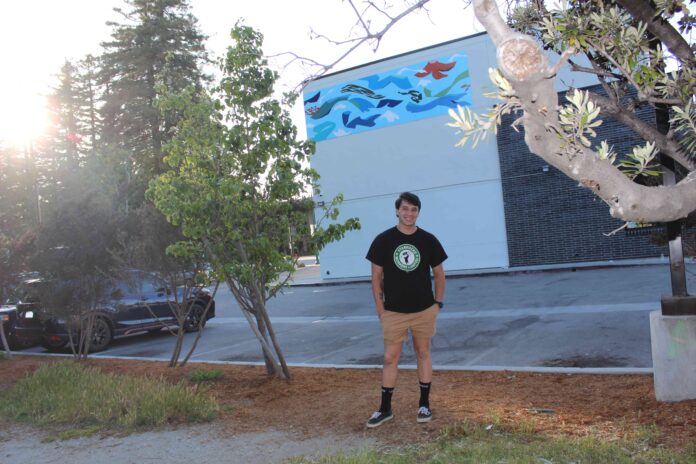Union organizer Joe Thompson is fresh off the May 11 news that his push to unionize the first Starbucks stores in California—something that seemed unlikely just a few years ago—was successful.
The 19-year-old, running for Assembly District 28, says the drive for workers’ rights in Santa Cruz went back to an informal gathering with coworkers in November near the untitled piece of art created in 1974 by Kenny Farrell, commonly referred to as the “Porter Squiggle.”
“We all went stargazing during a lunar eclipse,” he said. “We really just talked about, ‘What do we want to do to make sure we have a voice on the job?’ and ‘How do we get that?’”
Thompson is vying for the State Assembly seat left vacant by incumbent Mark Stone choosing not to run again. He’s up against known quantities, including former Santa Cruz County Clerk Gail Pellerin, Los Gatos Mayor Rob Rennie and Monte Sereno City Councilwoman Liz Lawler.
Thompson was born in the Sacramento area. He spent three years in Texas working at different Starbucks stores. He also held down a second job at a pizzeria.
Last September, he moved to Santa Cruz to begin his first year at UC Santa Cruz, majoring in Environmental Studies with a policy concentration.
For Thompson, the arrival of the coronavirus served to highlight serious problems with how Starbucks treats its workforce.
“We’re not getting paid nearly enough to do that job,” he said, adding the current climate helped spur labor organizing efforts across the country. “The reason why there’s so much union activity is all the Starbucks [locations] across the country are dealing with the same pandemic issues.”
For example, at the Ocean Street location where he works, he claims that the company took away a food benefit they used to get. And they started to crack down on other things, too, like making sure employees weren’t wearing more than one pro-union pin, according to Thompson.
“Starbucks is cutting hours of union leaders across the board,” he said. “Personally, my hours got cut.”
He says that happened as he was in the middle of a dispute filed with the National Labor Relations Board.
As their union organizing ramped up, company reps seemed to be hanging around more often, he asserts.
“They’ve been surveilling us more,” he said. “The upper management has had a lot of presence there.”
Starbucks denies hampering union organizing and says hours often fluctuate seasonally.
“From the beginning, we’ve been clear in our belief that we are better together as partners, without a union between us, and that conviction has not changed,” a spokesperson said. “Any claims of anti-union activity are categorically false. We respect our partner’s right to organize and are committed to following the NLRB process.”
While Thompson says he has a good relationship with Pellerin—even looping her in on different events he’s organizing—argues he’s the stronger candidate.
“I have nothing personally against her,” he said. “But I think we need young people represented.”
In a recent interview on KSQD’s “Talk of the Bay,” Thompson explained how this translates to boots-on-the-ground in the campaign arena.
“When you have a volunteer staff, they’re more motivated,” he told the host. “We’re able to knock on all doors.”
Thompson describes Rennie as another “decent” candidate, but says the Los Gatos elected official hasn’t gone far enough to make affordable housing available or improve brownfield sites.
“On some issues, we disagree, and we disagree heavily,” he said. “Rob voted against marijuana dispensaries in Los Gatos.”
Rennie says he’s not yet decided on which way he will vote as Los Gatos evaluates whether to permit commercial cannabis activities in town. Still, he did second a motion to deny marijuana businesses in the first place after California legalized recreational sales of the plant.
And while they’re on opposite ends of the political spectrum, in some ways, Thompson says, he shares more in common with Lawler than the others.
“Rob and Gail have both donated over $100,000 to both of their campaigns,” he said. “Even Liz and I agree on campaign finance reform.”
Thompson calls himself a pro-worker worker and notes he’s been endorsed by the California Democratic Renters Council.
Building affordable housing would be at the top of his to-do list if elected, he pledges, adding energizing youth now could help more Democrats get elected during the 2024 elections.
“It’s going to be a hard-fought race,” he said. “I think a lot of young people don’t actually see the value of voting down-ballot.
“These down-ballot races actually impact your life.”
Thompson says the sorts of things that resonate with the younger set—climate change, income inequality and the housing crisis—can be easy for an older generation to write off as too amorphous, too improbable or too idealistic.
While he’s still the longshot candidate, he’s currently riding the wave of the historic labor breakthrough that will surely be in the minds of some voters dashing into Starbucks for a cup of coffee on their way to the polls.
“If we keep electing the same people over and over, how can we expect change?” he asked. “Our campaign is less about party politics and more about what’s best for people.”













